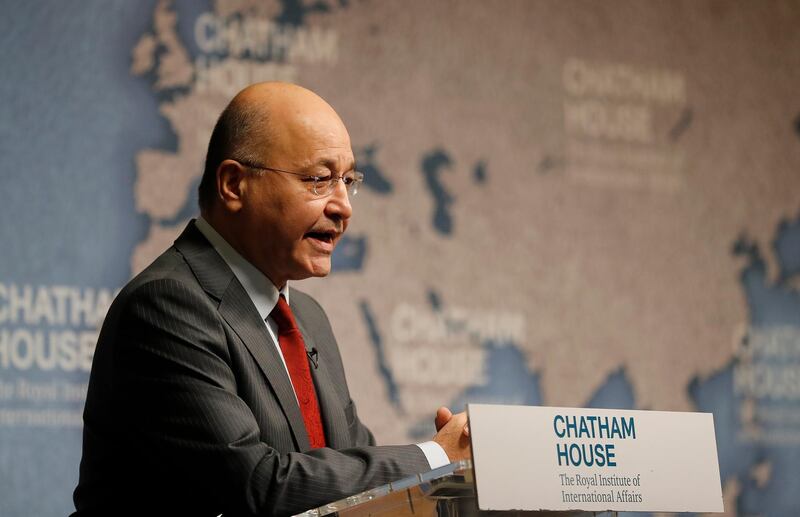Iraq has been a battleground for states and militias since the US-led invasion in 2003. The nation was still beset by violence when ISIS leader Abu Bakr Al Baghdadi proclaimed his caliphate from Mosul’s Al Nuri mosque exactly five years ago, before the terrorist group swept through the country seizing vast swathes of territory.
Now, as Iraq struggles along the path of rebuilding following the decimation of ISIS, its fragile equilibrium risks being thrown off kilter again by another conflict of others’ making.
Speaking at Chatham House in London, Iraqi President Barham Salih called for the US and Iran to de-escalate tensions. "There is a storm sweeping across the Middle East," he said. "We are right in the middle of it." His country's economy is in the process of recovery after a three-year slump but post-war reconstruction and low spending have slowed its growth, despite being rich in oil. One thing is for sure: the last thing Iraq or the wider region need is another war.
Mr Salih’s urgent call for calm serves as an important reminder that the stakes are high for vulnerable countries in the Middle East. As US President Donald Trump and Iranian President Hassan Rouhani ramp up the fighting talk, Mr Salih’s voice of reason should serve as a wake-up call for the world. This crisis does not simply affect Iran and the US; it is sending shockwaves across the Middle East.
Iraq is particularly at risk, split socially, politically and economically between pro-Washington and pro-Tehran factions. As tense political negotiations got underway following Iraq's inconclusive election in May last year, then US envoy Brett McGurk and Islamic Revolutionary Guard Corps commander Qassem Soleimani tellingly both appeared in Baghdad, hoping to engineer an outcome that suited their respective nations. With tensions now rising, Iraqi intelligence is investigating recent attacks against US-linked targets in Basra and Baghdad, which have been widely viewed as a shot across the bow from Tehran to Washington.
For decades, Iran has sought to impose its will on Iraq, violating Baghdad’s sovereignty in the process. Relations between the two are inevitable since they share a 1,500km border, while Iraq depends on Iran for electricity, water fruit and vegetables. But Tehran has abused its influence to smuggle ballistic missiles to its proxies in Iraq and meddle in the nation’s internal affairs.
This is an extremely delicate moment for Iraq, whose transformation will be abruptly halted if war erupts. With a new parliament convening in the autumn, Mr Salih said he hoped the focus would shift from conflict to reconstruction and development. The nation is in the throes of an infrastructure crisis and needs 12,000 schools. It must tackle corruption and deliver basic services, the lack of which prompted months of protests last summer over failing water and electricity supplies. The country must also protect itself against the remnants of extremism.
With 70 per cent of its population under 30, Iraq has enormous economic potential. But its people will not be granted the peace and prosperity they deserve if Iraq continues to be deployed as a proxy in a battle for regional control.





